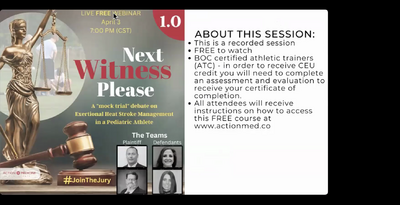NWP 1.0 - Scenario Information
PLAINTIFF
Susan A. is a 15-year-old HS soccer player who attends Lake Bruin High School in Lake Bruin, CA. Otherwise healthy athlete with no previous medical conditions or heat-related illnesses; competitively playing for 7 years.
DEFENDANTS
Lake Bruin Consolidated School District, Lake Bruin High School, John - Principal, Mary - School’s Athletic Director, Paul (School Athletic Trainer), and Joann (Head Soccer Coach)
LOCATION:
Lake Bruin, CA is a population of 150,000 with one Level 1 trauma center, one Level III trauma center, and two Level IV trauma hospitals. The high school is approximately 2 miles from Rolling Hills Regional Hospital (Level III).
INCIDENT TRANSPORT INFO:
After EMS responded and transported the athlete to Rolling Hills Regional Hospital, the patient was stabilized and transported to the Children of the Lake Regional Medical Center, the Level 1 (and pediatric wing) center that is 15 minutes from Rolling Hills Regional Hospital where she was a critical care pediatric unit, and released from the hospital 3 weeks later.
LAWSUIT SUMMARY:
Plaintiff is suing the Defendants for $10,000,000 for negligence for failure to provide appropriate supervision and care, personal damage and suffering, mental anguish, and current and future medical bills related to the case. The medical experts advised the athlete at the hospital to discontinue playing soccer due to potential health risks.
Non-Death Scenario
A 15-year-old soccer player collapsed during practice in July.
The athlete received cold water toweling with a fan by the athletic trainer with coaching staff assistance (neither whole-body cold water immersion nor core rectal thermometer was utilized) and was transported by EMS to a local hospital (5-minute transport time) where the athlete’s core body temperature was obtained in the emergency room (106.2 core body temperature) approximately 35 minutes after initial signs/symptoms were recognized and EMS activated. The athlete spent 3 weeks in the hospital, including exertional heat stroke and exertional rhabdomyolysis diagnoses.
DEBATE QUESTION:
Whether or not a core rectal thermometer should be utilized in pediatric athletes. The school’s athletic director and school board would not permit the athletic trainer to utilize a core rectal thermometer in emergencies due to concerns about possible physical and emotional harm it would do to a minor, and being sued by parents.
BACKGROUND INFO:
What state is this case in? This case will be based on CALIFORNIA.
Additional information about this non-death EHS case:
AT and Coaches were both on-scene at the incident.
Practice Weather Conditions:
Incident Date = July 15
Weather conditions - WBGT was 73% at the start of practice
Practice Began at 3:30 PM; athletes had been on the field for approximately 15 minutes doing general warm-up and pre-practice drills.
The athlete began exhibiting signs/symptoms at approximately 4:15 PM
The athlete was immediately removed from practice at which time the AT moved to the sideline tent
Vitals signs and assessments were taken, and altered mental status was observed. The patient was diaphoretic and nauseated, GCS = 13, HR = 155, RR = 28, BP = 146/76, SP02 = not taken, and blood glucose not taken.
AT began cooling with cold towels and a fan, as well as called 911 at approximately 4:19 PM
EMS arrived at 4:24 PM
EMS re-assesses and transports the patient at 4:34 PM
EMS arrives at the hospital at 4:40 PM
The patient was re-evaluated in ER, as well as full vitals were taken including core rectal temp of 106.2 F at approximately 4:46 PM, at which time the ER began rapid full body cooling, IV intervention, etc.
Other KEY INFORMATION POINTS ON THIS MOCK CASE:
The AT works for the school (no teaching responsibilities) through a local hospital for the last 2 years. Athletic Trainer has been a BOC Certified Athletic Trainer (ATC) for 5 years.
AT had created an emergency care protocol manual that initially included core rectal temperature as a treatment process, however, the school would not allow the use of a core rectal thermometer over concerns they would be sued.
Core rectal temperature was removed from the emergency care protocol but did maintain rapid cooling with an immersion tub if an athlete exhibited signs of EHS.
No tub was present at the time of the incident nor were any measures initiated to begin whole-body cooling per the protocol.
Water breaks were made available during practice every 25 minutes. On the date of the incident, a total of 4 breaks were scheduled during the practice.
The AT had attempted (with email documentation) that demonstrated an effort to have all coaches receive training in emergency care procedures on the protocols, but the AD made it optional for coaches to participate as they already had received online training, received the EAP manual electronically, and participated in school in-services. Coaches in the following sports completed the training session: Football, Tennis, Softball, Soccer, and Lacrosse. Track/Field, Basketball (girls and boys), and Volleyball did not participate.


